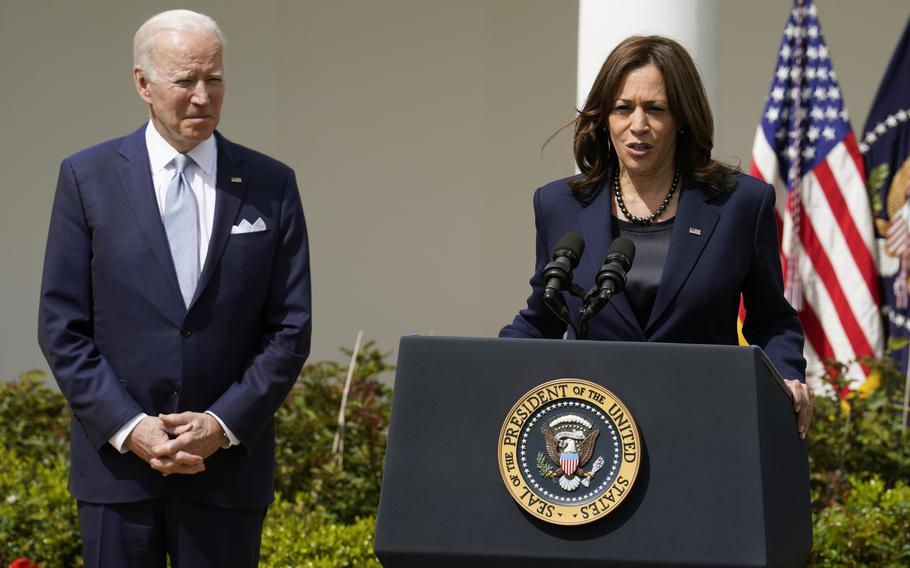
U.S. President Joe Biden listens to Vice President Kamala Harris as she delivers remarks on the Ghost Guns Rule in the Rose Garden at the White House in Washington, D.C., on Monday, April 11, 2022. (Yuri Gripas/Abaca Press)
WASHINGTON (Tribune News Service) — Vice President Kamala Harris announced new steps designed to reduce the cost of federal home loans for Americans saddled with medical debt and make it easier for veterans to have health care bills forgiven during an event Monday at the White House.
“I have met so many people in so many communities in our nation who are struggling with this burden, many of whom are managing an illness or an injury at the same time, and who stay up at night staring at the ceiling, wondering if they will ever be able to pay off their medical debt,” Harris said. “No one in our nation should have to endure that.”
The efforts include a push within the federal government to stop considering medical debt when determining eligibility for loans — including in programs like the Department of Agriculture’s $20 billion rural housing program. Because the government won’t consider how much applicants owe in medical expenses, those in debt should receive more favorable terms on loans to buy or build new homes.
The Department of Veterans Affairs will also cease reporting of debt that veterans owe the VA for their health coverage to credit reporting agencies, and will modernize programs designed to help former service members have some of their medical debts forgiven. The department will launch an online portal to process forgiveness requests, and simplify eligibility criteria in a bid to expand the number of veterans who take advantage of existing programs to discharge their debts.
One-third of American adults currently have medical debt, with Black and Hispanic households more likely to incur it than White households, according to the White House.
Harris made the announcement Monday during an event with White House economic adviser Brian Deese, Secretary of Health and Human Services Xavier Becerra and budget director Shalanda Young.
The moves come as the White House has sought ways to reduce costs for Americans facing inflation that has soared during the coronavirus pandemic, leading to some of the highest price increases in four decades. The inflation spike prompted the Federal Reserve to begin raising interest rates, resulting in higher costs for mortgages and consumer credit.
“The president and I know that one of the biggest challenges facing working families today is the rising cost of living,” Harris said. The Biden administration estimates that about one in three American adults has medical debt, which accounts for more debt collections than credit cards, utilities and auto loans combined.
The administration’s actions follow previous efforts by the consumer credit agencies Equifax, Experian, and TransUnion to remove medical debt that was either less than $500 or that had been repaid from credit reports.
But more than 11 million Americans are estimated to have medical debts above $2,000. The Consumer Financial Protection Bureau said in a March 1 report that around $88 billion in uncollected medical debt was reported to credit bureaus, making up some 58% of all uncollected debt on U.S. consumers’ credit reports.
The CFPB is expected to release a report on consumer complaints related to medical billing later this month, and announced Monday that it is making preventing unlawful medical debt collection a new enforcement initiative. The agency has previously said it is reviewing whether medical debt should be removed from consumer credit reports altogether.
The Department of Health and Human Services announced that it is requesting data from more than 2,000 medical providers on bill collection practices, financial product offerings and debt-buying practices. The government says it will begin using that information as it determines federal grants, in a bid to dissuade hospitals and health care facilities from abusive billing practices.
___
©2022 Bloomberg L.P. Visit bloomberg.com.
Distributed by Tribune Content Agency, LLC.